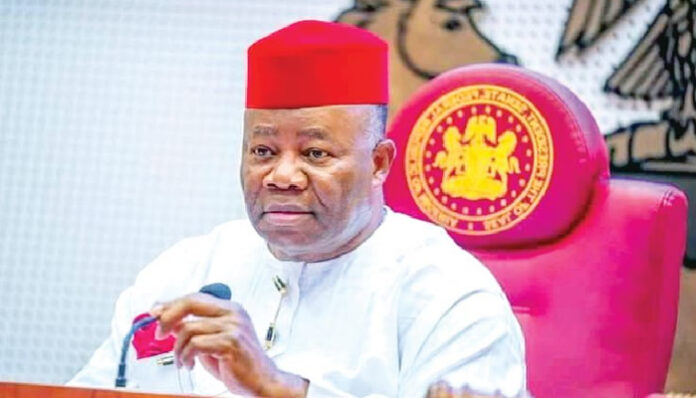*Security experts say economic hardship has weakened family values, fueling cybercrimes Sunday Aborisade in Abuja and Sunday Ehigiator in Lagos
President of the Senate, Godswill Akpabio, yesterday, said the current social and economic challenges were not caused by the President Bola Tinubu administration.
He said the suffering and pains were caused by past administrations in the country, which refused to take certain realistic economic actions as and when due.
At the same time, security experts at the launch of a book, ‘Cybercrime, Digital Forensic Readiness, and Financial Crime Investigation’, in Abuja, have revealed that the rise in economic challenges, coupled with weakened family structures, were increasingly driving Nigerian youths into cybercrimes.
Akpabio, in a statement, however, assured Nigerians that the current administration in the country would leave an enduring legacy that would guarantee a better future.
Akpabio, a law graduate of the University of Calabar, made the remarks at the weekend in Calabar at the UNICAL ’87 Law Class Re-Union 2024.
Addressing his audience which included his old classmates, senators who accompanied him, UNICAL management staff and students, he reiterated that the current difficulties that Nigerians were going through were the results of past maladministration in the country.
“The difficulties we are witnessing in our nation today were not caused by the present administration. These are as a result of years of maladministration.
“Any country that does not have backbone infrastructure, you don’t have something to develop, you don’t save for the raining day, when there is economic malaise such as we are witnessing in the world today, such country is bound to be affected.
“The good news is that under President Bola Ahmed Tinubu, we have hope today, that there is light at the end of the tunnel.
“The things that we are trying to do now, we are doing for posterity. Not for ourselves. Be assured that this administration will leave behind lasting legacies that will guarantee a better future,” he said.
The statement added that Akpabio had earlier led his old classmates to pay separate courtesy visits to the Governor of Cross River State, Bassey Otu and the Vice Chancellor of UNICAL, Professor Florence Obi.
The UNICAL VC used the opportunity to narrate a legion of challenges facing the institution particularly the the area of infrastructure.
Akpabio told the University management that the ’87 Law Class decided to congregate at the institution primarily to do an evaluation on the state of affairs of their alma mater and to see how best they could be of assistance to the institution that nurtured them.
He however, announced, on behalf of the ’87 Law Class, a donation of two Coaster buses for the Faculty of Law and UNICAL Student Union Government(SUG).
Governor Otu, also a UNICAL graduate, assured the ’87 Law Class that visited him that the government of Cross River State would partner them on whatever they planned to do for the institution.
“We want to look at what you will do and Cross River State will also partner you and add to whatever you are going to do,” Otu said.
Also speaking at the re-union, Patron of the ’87 Law Class, Justice Okon Abang of the Court of Appeal, observed that the journey of his former classmates to the level they are now had not been without challenges.
Experts: Economic Hardship Weakened Family Values, Fueling Cybercrimes
Security experts at a recent book launch titled, ‘Cybercrime, Digital Forensic Readiness, and Financial Crime Investigation’, in Abuja, have revealed that the rise in economic challenges, coupled with weakened family structures, are increasingly driving Nigerian youths into cybercrimes.
The book, authored by Tombari Sibe, with contributions from Christian Kaunert, shed light on the alarming rise of online fraud among young Nigerians, linking it to the high unemployment rate, now at 5.3 per cent, and the breakdown of traditional value systems.
“The surge in cybercrime incidents across Nigeria has been quite disturbing,” Sibe stated during the event, highlighting that beyond the financial losses suffered by victims, the nation’s global reputation was taking a serious hit.
According to Sibe, despite ongoing efforts by law enforcement agencies, the caseload continues to grow exponentially, largely due to the lack of coordinated research into the root causes and dynamics of cybercrime in the country.
Sibe emphasised the critical need for enhanced digital forensic resources in institutions like the Economic and Financial Crimes Commission (EFCC) and the Nigeria Police Force.
“The lack of forensic capabilities within these institutions has hampered their ability to effectively investigate and prosecute cybercrime cases,” he noted.

























